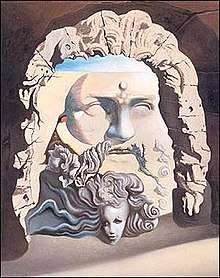Destino
| Destino | |
|---|---|
 | |
| Directed by | Dominique Monféry |
| Produced by |
|
| Written by | |
| Music by |
|
| Edited by | Jessica Ambinder-Rojas |
Production company | |
| Distributed by | Walt Disney Studios Motion Pictures |
Release date |
|
Running time | 7 minutes |
Destino is an animated short film released in 2003 by Walt Disney Feature Animation1. Destino is unique in that its production originally began in 1945, 58 years before its eventual completion. The project was originally a collaboration between Walt Disney and Spanish surrealist painter Salvador Dalí, and features music written by Mexican songwriter Armando Domínguez and performed by Mexican singer Dora Luz. It was included in the Animation Show of Shows in 2003.
History
Destino (Spanish for destiny) was storyboarded by Disney studio artist John Hench and artist Salvador Dalí for eight months in late 1945 and 1946; however production ceased not long after. The Walt Disney Company, then Walt Disney Studios, was plagued by financial woes in the World War II era. Hench compiled a short animation test of about 17 seconds in the hopes of rekindling Disney's interest in the project, but the production was no longer deemed financially viable and put on indefinite hiatus.
In 1999, Walt Disney's nephew Roy E. Disney, while working on Fantasia 2000, unearthed the dormant project and decided to bring it back to life. Walt Disney Studios Paris, the company's small Parisian production department, was brought on board to complete the project. The short was produced by Baker Bloodworth and directed by French animator Dominique Monféry in his first directorial role. A team of approximately 25 animators deciphered Dalí and Hench's cryptic storyboards (with a little help from the journals of Dalí's wife Gala Dalí and guidance from Hench himself), and finished Destino's production. The end result is mostly traditional animation, including Hench's original footage, but it also contains some computer animation.
Description
The seven-minute short follows the story of Chronos and his ill-fated love for a mortal woman named Dahlia.[1] The story continues as Dahlia dances through surreal scenery inspired by Dalí's paintings. There is no dialogue, but the soundtrack includes music by the Mexican composer Armando Dominguez. The 17-second original footage that is included in the finished product is the segment with the two tortoises (this original footage is referred to in Bette Midler's host sequence for The Steadfast Tin Soldier in Fantasia 2000, as an "idea that featured baseball as a metaphor for life").
Public screenings
Destino premiered on June 2, 2003 at the Annecy International Animated Film Festival in Annecy, France. The film was nominated for the 2003 Academy Award for Best Animated Short Film.[2] Destino was released theatrically in a very limited release with the film Calendar Girls.
In 2005, the film was shown continuously as part of a major retrospective Dalí show at the Philadelphia Museum of Art, titled The Dalí renaissance: new perspectives on his life and art after 1940.[3]
The film was also shown as part of the exhibition Dalí & Film at Tate Modern from June to September 2007, as part of the Dalí exhibit at the Los Angeles County Museum of Art from October 2007 to January 2008; at an exhibition at New York's Museum of Modern Art called Dalí: Painting and Film from June to September 2008; also at an exhibit at the Dalí Museum in St. Petersburg, Florida in 2008. In mid-2009, it had exposure in Melbourne, Australia at the National Gallery of Victoria through the Dalí exhibition Liquid Desire, and from late 2009 through April 2010 at the Dayton Art Institute in Dayton, Ohio, in an exhibit entitled Dalí and Disney: The Art and Animation of Destino.
In 2012, the film was featured in the "Dalí" exhibition at the Centre Georges Pompidou in Paris, France.
Home media release
The Disney DVD "True-Life Adventures, Volume 3" has a trailer for Destino, and mentions a forthcoming DVD release. Destino was made available on the Fantasia & Fantasia 2000 Special Edition Blu-ray released on November 30, 2010.
Notes
- ^ Additional production by Walt Disney Feature Animation Paris
References
- ↑ "Dalí, Disney short debuts after 57 years". Retrieved 3 August 2016.
- ↑ "After 58 Years, the Finally Completed 'Destino' Is Nominated For an Academy Award" (Press release). Los Angeles: PRNewswire. Shamrock Holdings, Inc. 2004-01-27. Retrieved 2016-09-20.
- ↑ Taylor, edited by Michael R. (2008). The Dalí renaissance : new perspectives on his life and art after 1940 : an international symposium. New Haven, Conn.: Philadelphia Museum of Art, distributed by Yale University Press. ISBN 9780300136470.
Further reading
- Barbagallo, Ron (2003). "The Destiny of Dalí's Destino". Animation Art Conservation.
- Bossert, David (2015). Dali and Disney : Destino : the story, artwork, and friendship behind the legendary film. Los Angeles: Disney Editions. ISBN 9781484707135. OCLC 902830950.
- Canemaker, John. "The Lost Cartoon By Disney and Dalí, Fellow Surrealists". New York Times (September 7, 2003).
- Conrad, Peter. "Hold on to your popcorn. This is cinema as Dalí thought it should be". The Guardian (May 20, 2007). London.